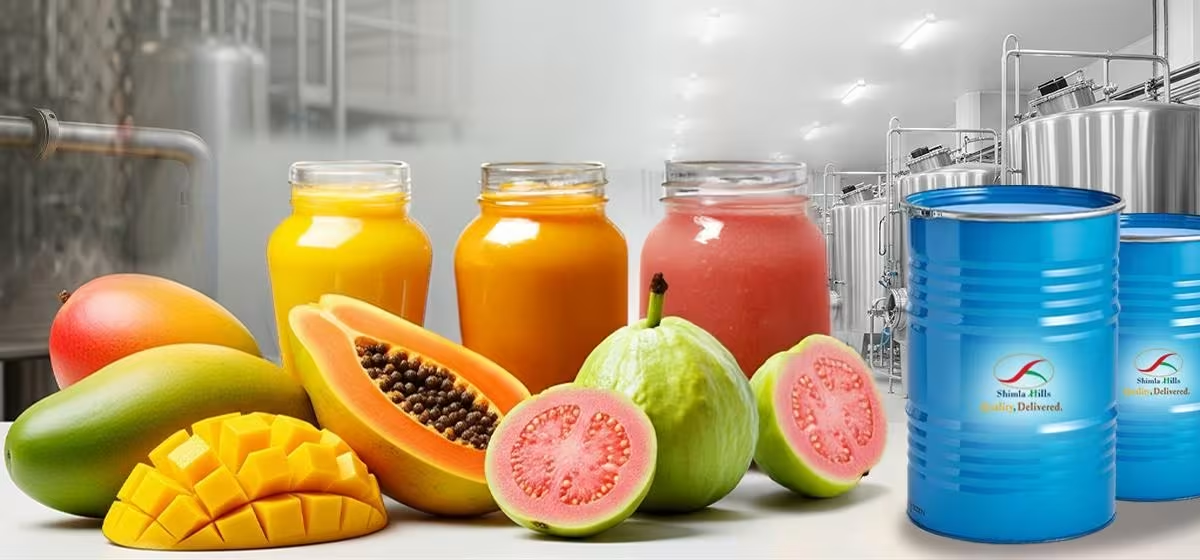Are you in the business of manufacturing fruit-based dairy products, beverages, or baked goods? If so, you already know the significance of consistency and shelf life in the food and beverage (F&B) industry. What keeps your products fresh and tasting good for months is not just good quality fruits. It also requires advanced processing techniques to ensure the fruit retains its essence and nutritional integrity for an extended period. That’s where aseptic fruit pulp processing is essential in the F&B industry. It is a reliable solution for delivering authentic seasonal fruit flavour and nutrition.
Shimla Hills, a renowned fruit puree supplier worldwide, helps F&B brands scale their business confidently with our premium aseptic pulp throughout the year. We leverage advanced aseptic technology to ensure freshness, extended shelf life, and safety of processed fruits—all this without the use of preservatives, added sugar, or artificial flavours or colours.
What is Fruit Pulp and How Is It Made?
Fruit pulp is the edible, soft part of a fruit obtained once you separate its seeds and skin. Its advanced processing begins with the careful selection of premium-quality ripe fruits. The meticulously selected fruits undergo cleaning, peeling, and deseeding procedures. After that, ripe fruits go through further processing to form aseptic puree/pulp and are packed in aseptic bags for storage and transportation.
Different Types of Fruit Pulp: Popular Varieties in India
India is the homeland of an extensive range of fruits. Shimla Hills provides a wide range of aseptically processed pulps for catering to global F&B manufacturing demands:
• Mango Pulp: We offer Alphonso, Kesar, Totapuri, Kesar, Raspuri, Neelam, and Raw Mango varieties.
• Banana Pulp: Indian Cavendish banana pulp.
• Guava Pulp: Both pink and white guava pulp varieties.
• Other fruit pulps include Pineapple pulp, Papaya pulp, and Passion fruit pulp.

All these different aseptic fruit pulp varieties, ensure longer usability and consistent quality for industrial food and beverage applications.
Aseptic Fruit Pulp Processing: Why It Matters for Quality and Safety
What makes aseptic fruit pulps stand out? The aseptic processing involves sterilising both the fruit pulp, as well as its packaging material separately. Even the filling of the fruit pulp takes place in a sterile environment. Therefore, this technique prevents microbial contamination while extending its shelf life – without chemical preservatives or refrigeration.
This results in shelf-stable, premium quality aseptic fruit puree/pulp that retains its authentic flavour, aroma, and nutritional profile. Our advanced production facilities make sure that every batch meets stringent food safety and quality standards. This makes us one of the leading fruit pulp manufacturers in India worldwide. Explore our website to find detailed information on our assortment of aseptic fruit purees/pulps.
FAQ's
1. Can we use aseptic fruit puree in beverages?
Yes, it is widely used in manufacturing of beverages, like smoothies, juices, dairy blends, and even cocktails or mocktails, as a base or flavouring component.
2. What is the shelf life of aseptic fruit pulp?
The shelf life of aseptic fruit pulps usually lasts up to 12 to 24 months. However, once opened, it’s recommended to use the product within 48 to 72 hours (provided it’s stored at -18 degree Celsius).
3. Is aseptic fruit pulp better than frozen pulp?
Yes, aseptic pulp is considered better than frozen pulp because it offers the advantage of easy transportation. Aseptic pulp doesn’t rely on cold chain for transportation. Plus, it has longer shelf life while retaining the natural nutrient integrity and flavour of specific fruits.

